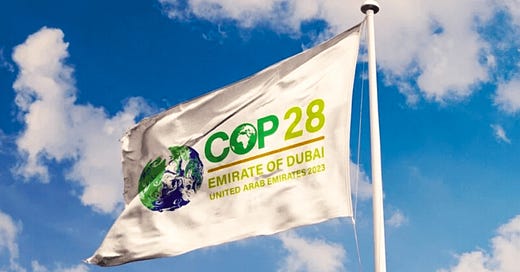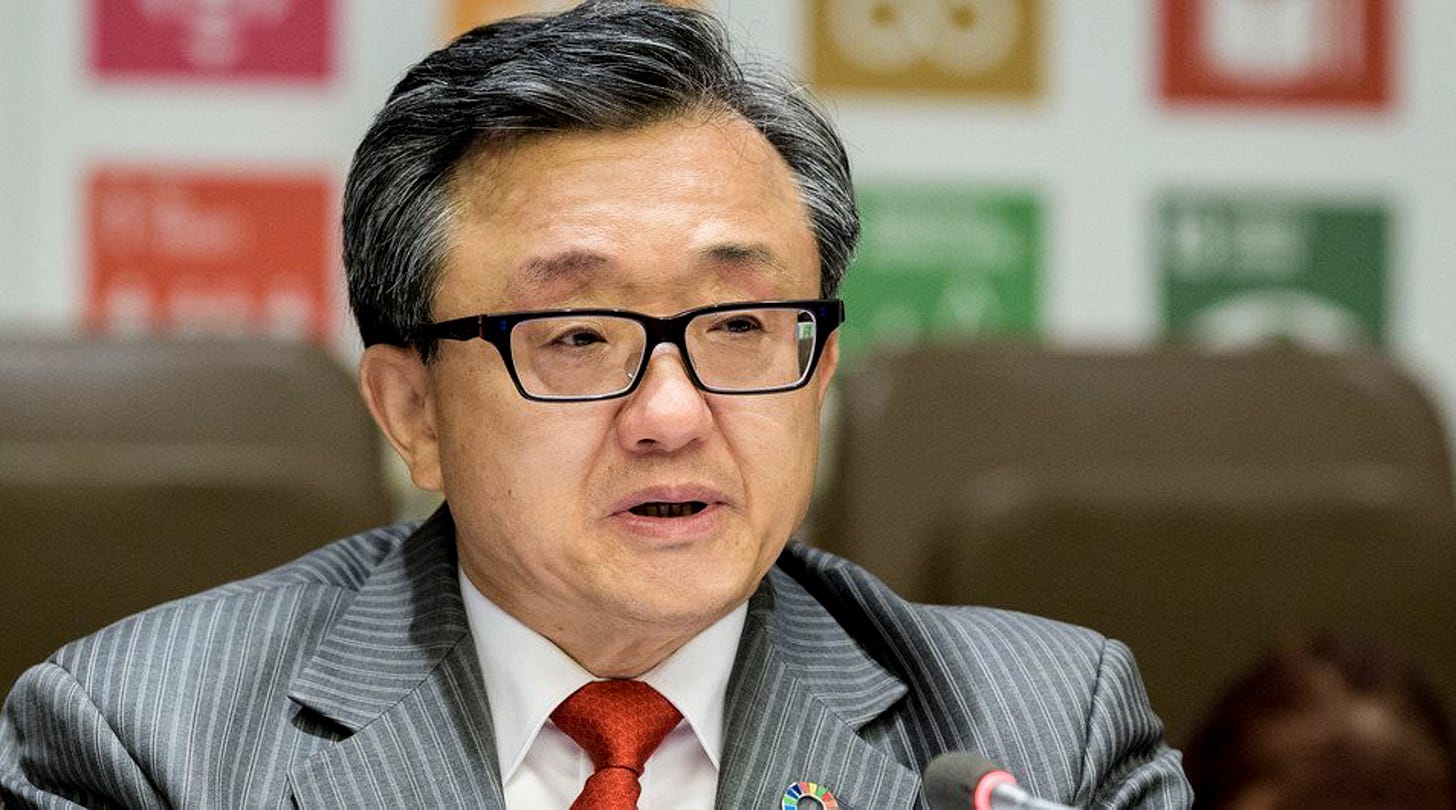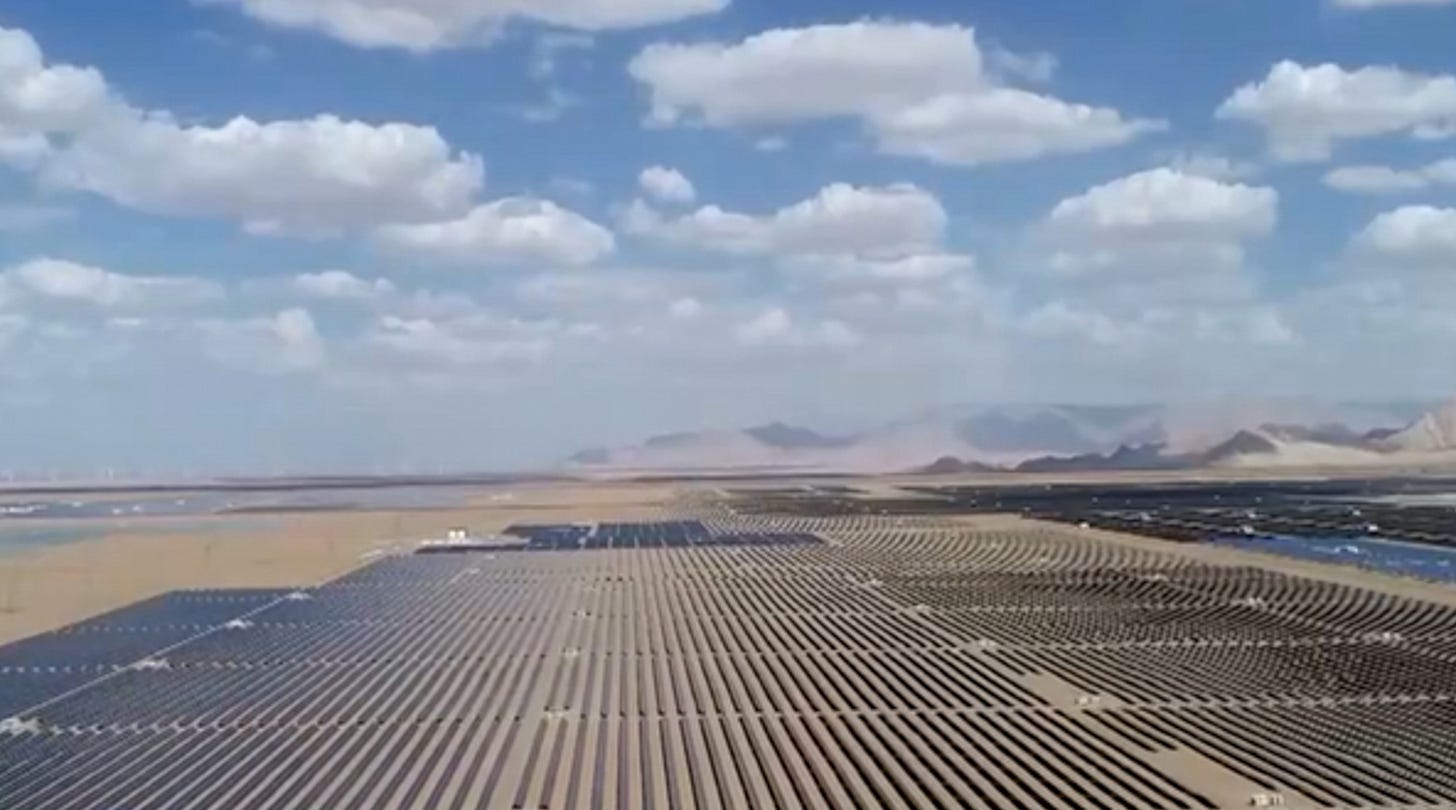the PRC at COP28
leader in climate-friendly infrastructure, Beijing shows less enthusiasm for emission reduction
A warm welcome to our latest post. The world’s eyes are on Dubai, and many column inches in the international media are telling Beijing what it should be doing at the COP. In this republished CHINA POLICY brief, we delve into perspectives presented in Chinese language sources, offering a slightly different viewpoint on China's stance at the COP.
Philippa
The PRC, world’s greatest emitter and heavyweight of global climate governance, will shape outcomes of the 28th UN Climate Change Conference (COP28), taking place in Dubai 30 November–12 December 2023.
gloomy stocktake
A first global stocktake on the rollout of the Paris Agreement heads the mandated COP28 agenda. It is unlikely to paint a rosy picture. Lack of global climate action and support will be in the foreground. Leaving for Dubai, Xia Yingxian 夏应显 MEE (Ministry of Ecology and Environment) Climate Department director and deputy head of the PRC delegation welcomed
an update on global progress installing new energy, and an assessment of current gaps and shortcomings, not least developed countries’ enactment failures
chances for developing countries to mitigate climate change, reduce poverty, develop sustainably and transform fairly
clear signals against political hurdles, e.g., protectionism, unilateral decisions, green barriers and climate-flagged cliques, tech monopolies, blockades, decoupling and supply-chain disruptions
Ahead of the Summit, Beijing and Washington, the two critical players, committed to a 10-point PRC–US common position on the stocktake. This echoes historic Sino-US joint efforts in the lead-up to Paris in 2015, argues Liu Yuanling 刘元玲 Chinese Academy of Social Sciences.
He cautions not to be too optimistic—a Trump victory in the 2024 US election may alter US positions.
a binary pattern
In the negotiations at UN Climate Change conferences, developing and developed countries are in a binary pattern, points out Chen Ying 陈迎 CASS (Chinese Academy of Social Sciences) Institute of Ecological Civilisation, noting
developed countries downplay or evade their historical obligations, shirking or delaying enactment of technical and financial obligations—yet require developing countries to reduce emissions
developing countries safeguard their development rights, given that eradicating poverty and improving people's lives are their top priorities
climate change, they insist, was mainly caused by greenhouse gas emitted since the Industrial Revolution by developed countries
this obliges them to lead in reducing emissions, and provide financial aid and tech transfer to developing countries
cooperation is governed by basic principles, including
equity
‘common but differentiated responsibilities and capabilities’
promotion of sustainable development
needed action
The Paris Agreement launched a process based on regular global stocktakes and nationally determined contributions (NDCs). Emissions reductions will remain a priority at Dubai, believes Xu Huaqing 徐华清 NCSC (National Centre for Climate Change Strategy and International Cooperation). Some states urge reevaluating the Paris Agreement's 2°C goal, favouring a more ambitious one below 1.5°C. Such a shift could inadvertently overturn the NDC model, reverting to a top-down framework for allocating responsibilities, argues Tang Xinhua 唐新华 Tsinghua University Institute of International Relations.
Europe, the US and small island states, says Xu, are nonetheless pushing for more global targets, such as peaking global greenhouse gas emissions before 2025, achieving a 43 percent reduction by 2030 through a global inventory. This would entail all parties committing to higher ambitions in their NDCs by 2030.
The PRC does not reject such quantitative targets altogether. Beijing, says Xie Zhenhua 解振华 PRC special climate envoy, welcomes a global renewable energy target, e.g. tripling capacity by 2030 from 2022—as supported by the G20, the COP28 presidency and the International Renewable Energy Agency.
PRC expert Li Zheng 李政 Tsinghua University Institute of Climate Change and Sustainable Development admits that this favour the PRC industry, with PRC-made wind turbines and solar modules able to supply a significant portion of global demand.
Yet, Beijing prefers 'phasing-down' rather than 'phasing-out' fossil fuels, reiterating its COP26 formulation. Abruptly phasing fossil fuels out would be ‘unrealistic’, argues Xie. Coal will underwrite PRC energy security well into the future. He adds that CCUS (carbon capture, utilisation and storage) could allow the continued burning of fossil fuels—sans emissions.
Sceptical of additional targets limiting fossil fuels, Beijing has however signalled that methane targets could be part of its upcoming NDC for 2035. Heated debates on the future of fossil fuels are inevitable at COP28, says Beijing News.
actions speak
Demonstrating progress is a strong card for the PRC. Ambition without action is pointless, says Hu Bin 胡彬 Tsinghua University Institute of Climate Change and Sustainable Development. Developed countries are dragging the process, runs its rhetoric. Summing up COP27 in 2022, Zhao Yingmin 赵英民 PRC chief negotiator, claimed that developed countries
prefer slogans to concrete action
engage in confrontation rather than cooperation
have created a huge gap in implementation, causing widespread dissatisfaction
Despite disagreement on addressing gaps, the key is to display tangible results. The PRC has set 2030 and 2060 as its own deadlines for carbon peaking and neutrality, baked into domestic policy and its most recent NDCs. It will hold firm to these targets at COP28. Given notable success and momentum in the wind and solar sector, Beijing is well-positioned to revise its 2030 renewable capacity target upward, set in 2020 at 1200 GW.
adaptation to the fore
Climate disaster is ringing alarm bells; adaptation will be a top concern at Dubai. Beijing has given support to a COP28 adaptation agenda that would strike a better balance between mitigation and adaptation. China suffered temperature rises significantly above the world averages in 2022, according to Yuan Jiashuang 袁佳双 National Climate Centre: extreme weather has become the PRC new normal, notes Jiang Zhaoli 蒋兆理 MEE (Ministry of Ecology and Environment) Climate Department. Less hyped than mitigation, climate adaptation resonates in the PRC climate response. In 2022, it issued a National Climate Change Adaptation Strategy for 2035.
Yet COP discussion on adaptation should not fixate on technical details, Xie has stressed. Instead, it should shift to such concrete areas as early warning and forecasting, disaster prevention and reduction, resilient cities, water conservancy, and natural ecosystems. Solutions should be tailored to each country's situation, with the primary goal of addressing the issue of public welfare, Xie has stated.
tension over financing
Adaptation funding will remain a tense issue at COP28, warns Tang Xinhua 唐新华 Tsinghua University Institute of International Relations. The UN Environment Program now estimates the demand gap to adapt to climate change at US$194-366 bn per year. A report to the COP27 reported that developing countries, excluding China, will by 2030 need US$2.4 trillion in funds p.a. to implement climate action.
Developed countries’ failure to provide and mobilise the promised annual US$100 bn in climate finance to developing countries made at the 2009 COP15 in Copenhagen is habitually called out by the PRC delegation, requesting them now to state how they plan to double adaptation funding as well. While delivering on earlier promises, developed countries should at COP28 make greater contributions to set up the new collective quantified goal, raising the floor on climate finance above the current US$100 bn annual target post-2025, says MEE’s Xia Yingxian.
Together with G77, Beijing has a long-held position that developed countries should decarbonise first and help developing countries financially and technically. Developed countries have an inescapable obligation and ability to address climate change, stated Xia in October.
The G77+China and other developing country blocs argued for a new Loss and Damage Fund for all developing countries to be written into the COP27 resolution and operational by 2024. Developed countries countered that finance should go to the most vulnerable countries only, excluding China, reports Caixin.
Setting up the fund is to be finalised at COP28. Not formally obliged to contribute, the PRC is nonetheless pressured by the US and EU to do so, given its hyper-growth and high emissions. Besides pressure from the Global North, Beijing, as a major emitter, faces calls from the Alliance of Small Island States to come good with loss and damage funding. Its status as an ally and leader of the Global South at stake, the PRC walks a fine line.
Will Beijing come good? Its cards close to its chest, the PRC publicly supports merely setting up the fund and similar programs, eschewing comment on its role.
Xu Huaqing anticipates change in the conventional definition of climate finance, and innovation in the sources of climate finance. China, too, needs finance. PRC experts such as Ma Jun 马骏 Beijing Green Finance and Sustainable Development Centre calculate C¥16 tn in green finance per year is needed for climate work in the PRC. Yet only 50 percent of this is currently being met, primarily on mitigation.
keeping the advantage
The PRC will continue to engage both in South-South and North-South cooperation to address the global climate crisis, said Xie Zhenhua at the China Pavillion on 30 November, the opening day, in Dubai.
Participants may discover that the keystone of PRC global climate leadership is not at COP, but its own framework, the Belt and Road Initiative. Focused on the infrastructure and the tech needed for a low-carbon future, Beijing is ratcheting up its South-South cooperation.
Bilateral climate cooperation agreements with over 40 developing countries, and some 50 South-South MOUs, testify to the extent of PRC–South engagement on climate. Since 2016, it has provided aid through the ‘10x100,000 initiative’, and via the umbrella ‘Belt and Road South-South Cooperation Initiative on Climate Change’, training officials and tech staff from over 120 countries.
Beijing's South-South cooperation program, unveiled prior to COP21 (2015) in Paris, provides diplomatic architecture to assist developing countries, yet has been plagued by slow rollout and institutional disorder, laments Zhang Zhiqiang 张志强 NCSC Foreign Cooperation and Exchange Department. The funding has, Beijing itself reports, delivered just 10 percent of its initially promised US$3.1 bn.
Ahead of COP28, MEE’s Xia highlighted that the PRC will boost support to other developing countries, e.g. in Africa, small island countries and least developed countries, to the best of its ability. Announcing such additional support could ease the tension at COP28, but its preference is for bilateral channels.
An ‘Africa Solar Belt’ project was announced in September. Part of the ‘Declaration on China-Africa Cooperation on Combating Climate Change’ jointly issued by PRC and Africa, negotiations are ongoing, said Xia as COP28 was about to open.
profiles
Xie Zhenhua 解振华 | China’s special climate envoy
COP28 will reportedly be Xie’s last, bringing to a close his long and colourful tenure as the face of Beijing's climate diplomacy. Xie is deemed tough but personable. His close relations with John Kerry, US climate envoy, has helped preserve climate dialogue between the two major emitters.
Xie has recently held that global decarbonisation entails free trade. Protectionism threatens to raise solar PV prices by 20-25 percent, he says, rendering the task of tripling global solar capacity by 2030 all the more difficult. China, the EU and the US have compatible green industries and markets.
Former NDRC (National Development and Reform Commission) deputy director and head of the former State Environmental Protection Agency, Xie became a pre-eminent climate diplomat. He helped broker the Paris Agreement and was appointed special climate envoy in February 2021, following Biden's appointment of John Kerry to an equivalent position.
Liu Zhenmin 刘振民 | former UN under-secretary-general for Department of Economic and Social Affairs
A career diplomat, Liu is part of PRC’s COP-delegation in Dubai and will reportedly succeed Xie Zhenhua 解振华 as China’s special climate envoy following COP28. Under-secretary-general at the UN 2017-22, he is well-versed in multilateral affairs. Liu has ample experience in climate; he has acted as deputy head of PRC delegations to multiple UNFCCC COPs and was involved in Paris Agreement negotiations. He is no stranger to contentious topics, having been charged with leadership of boundary and ocean affairs at MFA (Ministry of Foreign Affairs) through the peak of South China Sea tensions in the mid-2010s.
Liu graduated in English and law from Peking University, where he was a classmate of Li Keqiang 李克强 and Meng Hongwei 孟宏伟. He joined MFA in 1982 and has served the PRC and the UN in various capacities.
National Centre for Climate Change Strategy and International Cooperation | 国家应对气候变化战略研究和国际合作中心
Both a strategic research and global collaboration hub, the centre steers PRC climate change action. A department-level agency established by NDRC in 2012, it transferred to the Ministry of Ecology and Environment in 2018. It organises and researches climate change policies, regulations, strategies, and plans. It also runs response initiatives, think tank dialogues on climate change, public awareness campaigns, capacity-building programs, and consulting services.
A ‘carbon peak and neutrality professional committee’ (碳达峰碳中和专委会) set up jointly with the Chinese Society of Environmental Sciences brings together some 300 professionals.
context
7 Nov 2023: US and China issue joint statement on combating the climate crisis following four-day summit in California
7 Nov 2023: China issues long-awaited methane action plan
27 Oct 2023: personnel changes at MEE in the lead-up to COP28
21 Sep 2023: PRC climate envoy says phasing out all fossil fuels is ‘unrealistic’
30 Aug 2023: PRC climate envoy calls for stronger cooperation, win-win solutions
23 Jul 2023: MEE climate office director supports goal of tripling renewables by 2030
19 Jul 2023: John Kerry US climate envoy concludes three-day visit to Beijing
18 Nov 2022: COP27 concludes in Sharm El Sheikh; China supports loss and damage fund
5 Aug 2022: Beijing suspends US-China climate talks after Nancy Pelosi’s Taiwan visit; PRC climate envoy says blame lies with the US
1 Jun 2022: renewables 5-year plan aims to double 2020 wind and solar generation by 2025
22 Mar 2022: energy 5-year plan soft on coal, but sets bullish tone on renewables
11 Nov 2021: US and China issue joint declaration on climate at Glasgow COP26; PRC kills ‘phase-out’ language in cover decision
24 Oct 2021: top-level ‘opinions’ document guides journey to carbon neutrality
23 Sep 2021: Beijing pledges to stop building new coal-fired power plants abroad
12 Dec 2020: Xi Jinping announces strengthened 2030 climate targets
22 Sep 2020: China aims to achieve carbon neutrality before 2060
3 Sep 2016: China and the US ratify Paris Agreement
12 Dec 2015: PRC shapes historic Paris Agreement buoyed by cooperation with the US Obama administration








